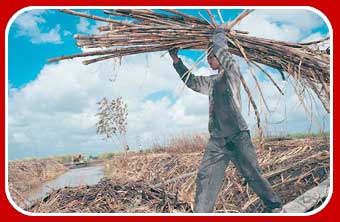| � |
The Sugar Trade
Many developing
countries depend on cash crops like sugar to bring in much
needed foreign exchange. Changes in the way sugar is traded
in the future could change the lives of many of these sugar
producers.
Cane or Beet
Most of the
world's sugar comes from cane, a grass that can reach six
metres in height. Sugar cane grows well in the tropics but
unlike other tropical cash crops like bananas and coffee,
cane farmers have to compete with the production of a completely
different plant called sugar beet. Grown in temperate climates
like Northern Europe, sugar beet is a root crop that looks
a bit like a large turnip
| Which
countries produce the most sugar cane and beet? |
 click
the globe for the answers click
the globe for the answers |
| Sugar
cane is often grown on plantations, taking up large areas
of land. Working on a sugar plantation is hard and unpleasant
work, and the pay is often low. |

� Duncan Simpson/Panos Pictures. |
Whether they produce
cane or beet, sugar farmers are dependent on the price they
can sell their sugar on the world market. As there are relatively
few buyers and sellers in sugar, prices can change easily.
If there is a sudden and unexpected fall in the world price,
countries that rely heavily on the money earned from sugar
can suffer great hardship.
Security for EU Beet
farmers
Sugar beet farmers in the European Union (EU) have benefited
from the Common
Agricultural Policy (CAP) to protect them from the fluctuations
in world sugar prices. With the CAP, EU farmers are guaranteed
a price 2.5 times higher than the world price for their sugar
crop. At the same time, tariffs on sugar imported from outside
the EU help keep out competition. This is such a good deal
that EU farmers have been producing masses of sugar beet,
but this also means that too much sugar is produced for the
European market. This surplus sugar is sold cheaply elsewhere;
almost four million tonnes were 'dumped' onto world markets
in 1998/9 alone. 'Dumping' of cheap sugar on other countries
undercuts local sugar producers, often driving them out of
business, and the excess supply brings the world price of
sugar down, leaving sugar growers across the world with smaller
profits.
| In
sugar mills, both cane and beet need to be processed so
that natural sugar is separated from the cane stalk or
beet root. |

� Penny Tweedie/Panos Pictures. |
Help for the poorest:
the Sugar Protocol EU farmers are not the only ones to benefit
from special trading arrangements. Since 1975, the Lome Convention
helped the 77 former European colonies that make up the African,
Caribbean and Pacific (ACP) group. According to the UN, 41
of the world's 50 poorest countries are ACP members. Part
of the Lome Convention called the 'Sugar Protocol' offered
help to ACP countries that export sugar cane. The Sugar Protocol
allowed them to sell sugar to the EU market tariff-free, and
at a higher price, much like European beet farmers. This way,
these countries could compete more successfully with developed
economies.
Winners and Losers
The Sugar Protocol
was particularly good news for countries that depend heavily
on sugar sales. In Fiji, where the sugar industry employs
nearly a quarter of the workforce and sugar accounts for nearly
40% of its exports, the benefits were felt right through the
economy:
However, in countries
that are not ACP members, the Sugar Protocol has made life
harder. In the Philippines, 400,000 people depend on the sugar
industry, most of which are small-scale tenant farmers. When
world sugar prices fall, Filipino farmers have to grow more
sugar cane to get the same return, yet many lack the machinery
to harvest the cane efficiently, and they have to use lots
of expensive fertilisers to boost productivity. When prices
fell below the cost of producing sugar in 1982, hunger and
malnutrition was widespread as many Filipino farmers could
not afford to feed their families.
Free Trade = Fair
Trade?
With the WTO's
push for more open trade, this is all set to change. In June
2000, EU and ACP countries signed a new agreement in Cotonou,
Benin to replace the Lome Convention. Part of Cotonou agreement
marked a big step towards 'free' trade in sugar. The EU will
have to cut its subsidies to sugar beet farmers by 36% and
get rid of the tariffs on sugar imports altogether. The new
agreement also ended the special trading arrangement in sugar
for ACP countries. Sugar producers in Fiji may have to make
some difficult decisions as they are faced with a more open
market without the protection of the Sugar Protocol. However,
these developments in the process of globalisation may help
improve the lives of sugar producers in countries like the
Philippines. By creating a more level playing field in trading
sugar, the new agreement will offer new opportunities for
all poorer countries that depend on sugar.
|
� |





